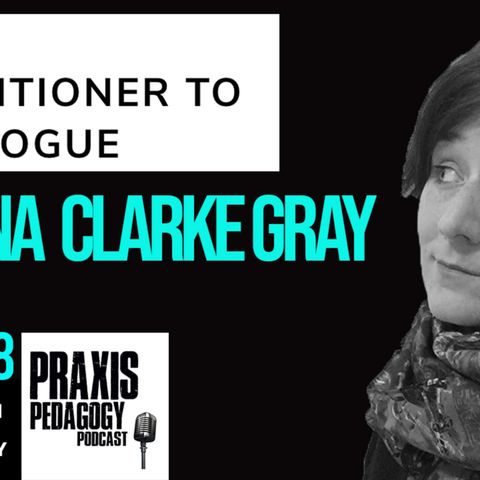Episode 28 - Brenna Clarke Gray

Jul 8, 2020 ·
59m 5s
Episode 28 – Brenna Clarke Gray a. A little background info… - Nine years as a community college instructor of English Literature.- Seven months as an educational technologist pre-COVID.- Research...
show more
Episode 28 – Brenna Clarke Gray a. A little background info… - Nine years as a community college instructor of English Literature.- Seven months as an educational technologist pre-COVID.- Research areas visual culture in CanLit, Canadian comics, and representations of Canadian in American superhero comics.- Now focusing on podcasting as a scholarly medium, open tenure processes, and edtech as care work. b. As we are entering our third month with this new landscape, how are you doing now? - Just screaming noises. c. What are you working on or towards nows - It is so hard to do anything other than support the transition to remote teaching right now. We are working hard on mowing through support tickets and frantically developing programming – we run three webinars a week for campus faculty – while also trying to plan a suite of programming for August. As faculty lead on the pivot, the programming is my baby and there isn’t time for a lot else.- Can I tell you about some of the work I wish I had more time for?o Academic integrity and data privacy.o Open tenure processes.o Community of Praxis podcast / SSHRC PDG d. From your perspective, what might be a few positives that we can learn from this change? - On a personal level, I hope our institution – which has traditionally had a culture that really struggled with the idea of hybrid or blended learning – really embraces the tools and sees the potential.- I hope we learn to extend more grace and compassion to our students, even if it comes because we unfortunately need it extended to ourselves. I hope when we are trying to prepare lectures or mark papers with a screaming kiddo in the room or a sick parent worrying our minds, we recognize that this is lived reality for our students even outside of the time of the pandemic. And I hope we carry that into the after. e. What were you (or are you) most surprised about with regard to how Higher Ed has adapted? (or, have we really adapted or are we just holding our breath?) - In a lot of ways, we haven’t adapted. A three-hour synchronous video lecture isn’t adapting; a pile of voice-over-PowerPoints and gigantic PDF files isn’t adapting; trying to replicate F2F isn’t adapting.- But that’s not every story, and I am genuinely amazed by the amount of high-level professional development happening everywhere right now. My colleagues are really trying and really committing – we have 100 people at every session we run right now – and I’m looking forward to seeing what that yields. f. What have you changed your mind on recently with this new landscape? - I am very troubled by my newfound commitment to the LMS, which is both uncool and off-brand for me but here we are. g. Where can facilitators/educators lean in? - Lean into care and community. Honestly, nothing else matters. h. What are you most hopeful about with regard to the next 12 months? - It’s been such a hard few weeks but it’s a moment where I can really believe in systemic change. Does the fact that we all now know that 90% of university jobs can be done from home mean better accessibility for disabled staff down the line? Does the fact that every university president has now made a statement decrying anti-Black and anti-Indigenous violence mean that our equity actions will have institutional weight behind them? Does the fact that privileged parents now see what life without childcare looks like mean we recognize affordable care as a social justice issue? I want to believe in all of it right now. i. In your opinion, what can we as educators begin doing to make this easier on our students? On ourselves? - This is not a moment to be beholden to content and coverage. Really examining the purpose of your course, what students need to learn from it to progress or for future classes or for job-readiness, and leave the rest behind.- At the centre of this moment is care: for our students, and for ourselves. How will you demonstrate care in your syllabus, assignment design, etc? How can you give yourself a break this fall, too? Academics have a tendency to not extend care to themselves, but this can make it hard to see when students need grace and compassion, too.★ Support this podcast on Patreon ★
show less
Information
| Author | Tim Carson |
| Website | - |
| Tags |
Copyright 2024 - Spreaker Inc. an iHeartMedia Company
